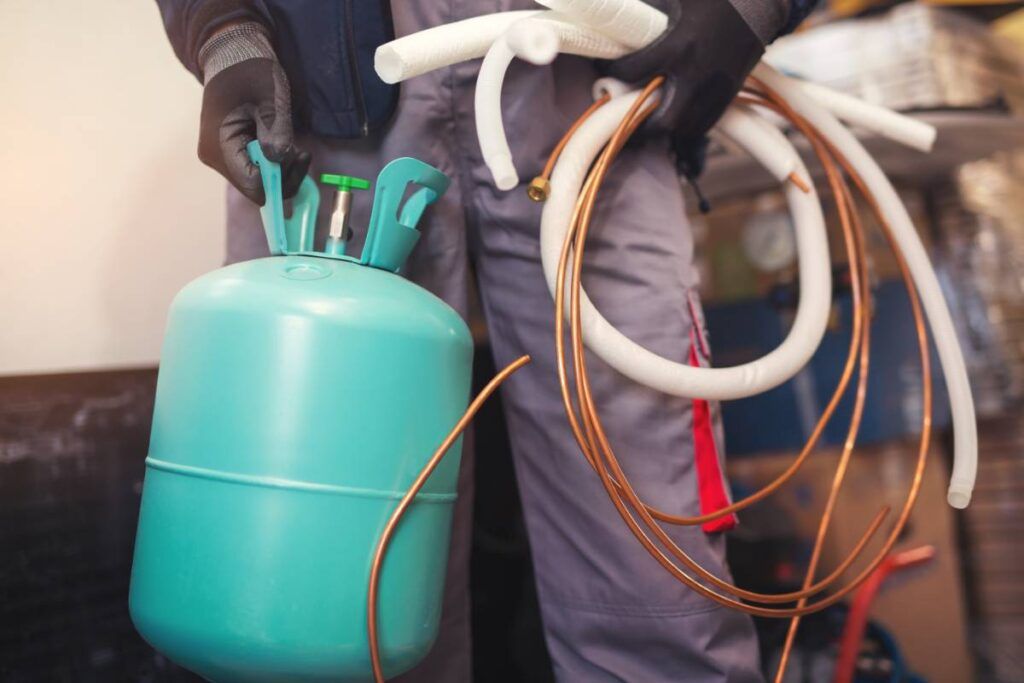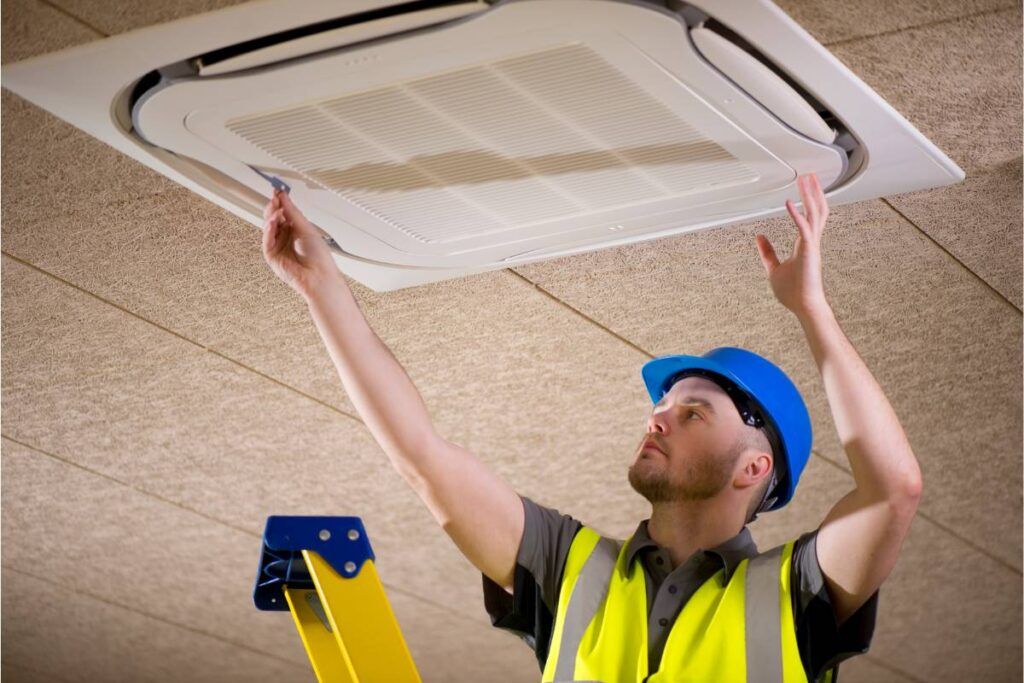A central air conditioner is a single unit that distributes cool air through a supply and returns duct system. The air should be either odorless or have a pleasant smell. But, if the smell is bad or weird, something is wrong with the unit.
Your central AC might smell like chemicals, rotten eggs, musty, or exhaust due to refrigerant leaks, animal infestation in the ducts, blocked drainage, dirty coils, or motor leaks. Clear the blockage and call an HVAC for animal infiltration, filthy coils, and leakage.
Sometimes, the smell might come from open chemical containers or cigarette smoke near the unit. This article will share the different smell types, what issues they signify, and how you can troubleshoot them.

Check out our list of top-handpicked products for all your electrical, appliance, and HVAC system needs to keep your home running smoothly.
This post includes some affiliate links.Central air conditioner releases a chemical smell.
When your central air conditioner smells like chemicals, it is most likely due to refrigerant leaks, molds in the evaporator coil, or open chemical contains.
The chemical smell could be chloroform, paint and cleaning supplies, chlorine, or musty ammonia.
Let us look at the reasons behind the chemical-like smell:
1. Refrigerant leakage

You will get a sweet chloroform-like smell when refrigerant leaks from your central air conditioner.
Sometimes, you will have an acetone smell.
The refrigerant absorbs the hot air inside the house, cools it down, and distributes it around the house.
If the air conditioner works fine, the refrigerant liquid will travel through the closed copper coils.
But due to the constant wear and tear, the copper coils can become weak and start leaking the liquid, causing an unpleasant chemical smell.
Even the refrigerant tank can cause leakage due to cracks, rust, and corrosion.
To identify a refrigerant leak, check for other signs besides the smell:
- House not cooling
- Bills are higher
- You hear a whistling or bubbling sound
- Frozen evaporator coil
What to do?
You need an HVAC expert to fix the refrigerant tank and the coils.
They will siphon out the liquid, replace the coils and tank, and refill the tank with new refrigerant.
Ensure that the HVAC expert fixes the coil and the tank and then refills them.
Otherwise, if he only refills the tank, there might be chances of leakage.
2. Open chemical containers near the unit
The indoor air handler helps in blowing the cold air throughout the house.
If the AC emits a chemical smell of paint or cleaning supplies, you might have open containers with these products near your unit.
The air handler is found in the storage.
If these containers are open, your air conditioner will suck the odors and release them throughout your house.
What to do?
Please close the open containers and keep them away from your unit and air handler.
The smell should fade after some time.
3. Electrostatic air filters

Central air conditioners with electrostatic air filters can release a chlorine or ozone-like smell.
The chemical smell is very annoying and can even create difficulty in breathing.
It is common for almost all house owners at least once.
What to do?
Lower the filter setting to remove your air conditioning unit’s chemical and ozone smell.
If the problem is not resolved, hire a professional HVAC to fix the problem.
4. Mold on the evaporator coil
Your central air conditioner will release a musty, ammonia-like smell when the evaporator coil develops mold.
The evaporator coil absorbs the heat and spreads cool air in your house.
Over time, the coil will accumulate moisture and encourage mold growth, releasing an ammonia-like smell.
What to do?
Check the coil’s condition first.
If there is mold, immediately call a professional to clean the mold.
Sometimes, the mold can spread to the ductwork, and the spores will spread in your house through the air, resulting in allergies and breathing issues.
Cleaning the ducts means extensive cleaning and is expensive.
Central air conditioner releases exhaust smell.
The central air conditioner’s exhaust smell could suggest overheating, motor leaks, wire issues, or refrigerant leakage.
Let’s look at the reasons in detail.
5. Central motor leaks

The central air conditioners do not depend on any gas for functioning but will still release an exhaust-like smell.
The reason could be cracks in the internal motor.
Sometimes, it means wire issues or overheating.
Overheating can melt and burn the plastic insulation of the wires, leading to an exhaust-like smell.
Solution
To prevent the smell, walk to the breaker panel and deactivate the system’s power.
Call a professional to take care of the matter.
6. Overheating
When the unit overheats, it will release an exhaust smell.
Overheating results from dirty air filters, condenser coils, or low refrigerant.
The unit will struggle too much to release the heat it absorbs through dirty air filters and condenser coils.
As a result, the unit will overheat and release an exhaust smell.
Low refrigerant makes the unit run nonstop to cool down the sucked air.
As a result, your unit can overheat and release an exhaust smell.
Solution
Change the air filters every 3 to 4 months.
Call an HVAC expert to clean the coils and check the refrigerant for leakages.
7. Refrigerant leak

Refrigerant leaks will sometimes emit a car exhaust smell besides the chloroform smell.
If your central air conditioner smells like car exhaust or a combustion engine, the reason is a refrigerant line leakage.
Refrigerant helps in cooling the absorbed air and releasing it in the house.
The air conditioner won’t give you cold air if the line leaks.
Sometimes people mistake the refrigerant leak as a water leakage.
To confirm it, check if the liquid puddles or vanishes.
If the liquid is dispersed in the air, it is a refrigerant liquid.
Solution
You must turn off your central AC and call a professional to repair or replace the refrigerant line.
Also, make sure that the house is well-ventilated.
Central air conditioner releases a burning smell.
Central air conditioners emitting burning smells imply mechanical issues, like a capacitor, wiring, or other faulty electrical components.
Sometimes, it is only the burning dust.
8. Dust burning

When you keep your unit off for a very long time, it will gather dirt and debris.
Suddenly turning on the unit will burn these dust particles and release a burning smell.
What should I do?
There is nothing to worry about here.
After all the dirt particles have burnt down, the smell should fade.
But if your system still discharges burning smells, call an HVAC professional.
9. Dirty air filters
When you do not change the air filters for a very long time, the airflow finds it difficult to enter or come out of the system.
As a result, the internal components work hard to push the air out.
It puts too much strain on the fans, motors, and other parts.
So, you receive a burning smell due to overheating of these components.
What should I do?
Change the filters every 3 to 4 months.
It is one of air conditioning maintenance’s most common and standard tips.
You can resolve maximum difficulties by changing the filters.
10. Broken capacitor
The central ACs will have a capacitor that powers the motor.
If the capacitor is broken, the motor will overheat and send off a burning smell.
Capacitors can break either due to overheating or power surges.
What should I do?
Turn off your unit, and call an HVAC.
If the capacitor has broken, it should be replaced.
11. Overheated motor

Due to the faulty capacitor, the motor will overheat and release a burning smell.
Over time, the motor bearings, too, will wear out, overheat the motor, and release the odor.
What should I do?
Turn off the air conditioner and call an HVAC expert to lubricate the bearings.
It might prevent the motor from overheating.
If the smell does not fade, keep your unit off and call a professional. The motor might require a replacement.
12. Electrical components are burning.
Burning plastic or rotten egg smell is dangerous.
It signifies burning electrical components.
The wiring systems of your central air conditioner will have plastic wear.
If the plastic melts and the wiring starts to burn, you receive a foul burning odor.
Reasons could be short circuits, loose screws, overheating, defective breakers, or worn-out electrical parts.
What should I do?
First, check for the real cause.
Check the breaker. Then, check the electrical components in the air conditioner.
Turn off your unit and call a professional to look into the matter.
Central air conditioner releases rotten egg smell.

The rotten egg smell could be due to fried circuit boards, dead animals, or gas from a nearby source.
13. Dead animal
Your central air conditioner releasing a rotten egg smell indicates dead critters inside the unit.
Over time, small animals like rodents and birds can make their way inside the unit, build a nest, and die inside it.
As a result, your unit will release a rotten smell when you start it on.
What should I do?
Turn off the unit and disassemble the ducts to check the inside.
Find the dead animal and remove it.
Only removing the animal won’t disperse the smell.
Call a professional to clean the ducts and the unit so that the smell does not bother you anymore.
14. Fried circuit boards or fan motor
Generally, a fried circuit board or fan motor will release a burning smell.
But it sometimes even emits a sulfur or rotten egg smell.
When you have a fried circuit or motor, the plastic components around the wiring inside the unit will melt and emit a foul, stinky, rotten egg smell.
What should I do?
When you receive a rotten egg smell, please turn off your unit and inspect it.
If the problem is a fried circuit board or fan motor, call a professional to fix the problem.
You might also require the local fire department if you suspect a fire hazard.
15. A gas smell from a nearby source
Both natural gas and propane are treated with mercaptan, which releases a rotten egg smell.
You can suspect a gas leak from your central unit if you get a rotten egg odor.
If the central air conditioner is in the basement, the rotten smell might come from the furnace, which circulates through the AC ducts.
Sometimes, the gas leakage might be from some nearby source, like the stove or room heater.
The unit will absorb this odor and release it into the air.
What should I do?
Turn off your air conditioner and find the gas source.
You need a professional to fix the problem if it is the furnace.
Open the doors and windows of your house to let the gas escape.
Avoid using electrical and gas appliances or lighting flames.
Call the gas company or local HVAC service representative.
Central air conditioner releases a gunpowder smell.

Central air conditioner releases a gunpowder smell due to motor or circuit panel failure.
16. Failed circuit panel or fan motor
When your central air conditioning unit ages over time, the efficiency of the motor or circuit panel will reduce.
So, when the fan motor or the circuit panel fails to work properly, the unit overheats and releases a gunpowder or firework smell.
Solution
When you smell gunpowder or firework odor, please turn off your unit and call a professional HVAC to examine and correct the problem.
Central air conditioner releases cigarette odor.
A cigarette smoke odor is because someone is smoking near the unit.
17. Smoke infiltration
Most house owners are unaware of the demerits of smoking near the central air conditioner.
When you smoke indoors near the unit, it will suck in the air and release with the airflow.
As a result, your unit will release a smoky, cigarette-like smell.
Excessive smoke gets absorbed by the house’s drywall, furniture, and carpet.
When you smoke too much, the smoke will get pushed into the evaporator coil, penetrate it, and the unit will push out of the house every time to turn on the central unit.
Solution
Stop smoking inside the house.
Call a professional to sanitize the evaporator coil, other air conditioning parts, and your house.
Replace the drywall, rugs, carpet, and furniture to eliminate the smell.
Central air conditioner releases sewer smell.
The sewer smell is due to the sewage gas released due to a nearby source or damaged sewers.
18. Damaged sewer lines
A cracked or clogged sewer line will make your central air conditioner release a sewer gas smell.
When a sewer line is cracked or clogged, sewage will back up and release a sewer or methane gas smell.
The sewer line is near the air ducts of your house.
If the problem persists, your house will be filled with this methane gas, and you will suffer from various health issues in no time.
Solution
When the sewer pipe malfunctions and you get methane odors, turn off your unit and call a professional plumber to fix it.
Central air conditioner releases a musty odor.

A musty odor is mostly due to mold and a blocked drainage system.
19. Dirty evaporator coil
When the evaporator coil is dirty, it encourages mold.
The location of the evaporator coil is dark, the blower blows warm air when the coil gets dirty, and condensation forms on the coil when warm air flows.
The condition is perfect for mold growth.
When the coil accumulates dirt, it gives mold to thrive.
How to fix the problem?
Hiring a professional HVAC team to clean the coil and remove the mold would be best.
You can prevent mold growth by installing a UV germicidal lamp.
20. Clogged condensate drain line
When the condensation becomes too much, it will drop to the drain pan and then escape through the drain line.
The water will come back into the drain pan if the line is clogged.
Due to the moisture accumulation, mold will develop and stay.
That is why you get a musty smell whenever you turn on the central AC.
How to clear the condensate drain line?
You can hire a professional to clear the lines.
For a DIY cleaning step, try the following steps:
- Turn off the unit.
- Find the condensate drain line and locate the access point.
- Flush it with ¼th cup of distilled vinegar and let the solution sit for 30 minutes.
- Now, flush the pipe with clean water.
- Repeat this every month.
21. Leaky air ducts

The central air conditioners spread the cold air to your house through the air ducts.
If there is a disconnection or leakage, the unit absorbs the surrounding air filled with dirt, dust, moisture, and mold spores.
Therefore the ducts will develop mold and release a musty smell.
How to fix duct leakage?
Use 1-2 punches of duct sealing to seal the leakage.
Call a professional to clean the ducts and eliminate mold, dirt, and moisture.
How can I prevent the central air conditioner from smelling?
Regular unit maintenance can prevent smells and other issues, like weird noises, water leakage, etc.
- Check the air filters monthly for dirt buildup and change or clean the air filters every 3 to 4 months.
- Avoid smoking in your central AC room.
- Avoid keeping any open chemical containers near your air conditioner or air handler in the basement.
- Perform regular maintenance and servicing of your central AC every year. The experts will analyze your unit and inform you about the changes to be made. It will further encourage the smooth functioning of your unit.
Final words
When a central air conditioner smells weird, it is quite concerning.
The problem may be a simple one or something serious.
Sometimes the unit smells weird because the unit absorbs the smell from the surrounding, like cigarette smoke, open chemical containers, sewage, or electrostatic filters.
Other times, the strange smells indicate refrigerant leaks, clogged drainage systems, faulty electrical components, overheating, or dead animals.
Whatever the smell type is, you must identify it to examine the problem and inform the professionals.
Cross-check with the smell types and reasons this guide shares to find out what is wrong with your unit.
Why does my air conditioner smell like feet?
Clogged drainage, standing water in the drain pans, and ductwork leaks make the air conditioner smell like feet. Perform regular maintenance and cleaning to prevent it.
Why does my air conditioner smell when the compressor is off?
When you turn off the compressor, the evaporator coil warms up, the moisture in the coil evaporates, and it absorbs the organic material odor on the coil fins. It further gets distributed into the airflow.
